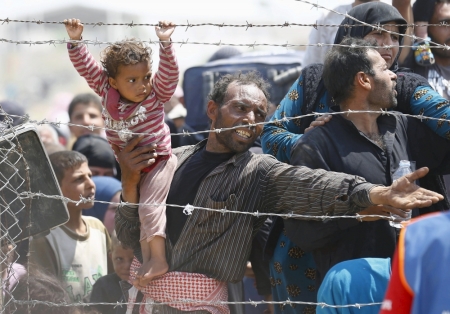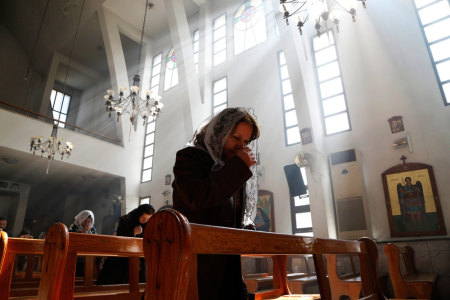ISIS Holds 227 Assyrian Christians Hostage as World Watches Genocidal 'Ethno-Religious Cleansing in the Middle East,' Says Relief Worker

Over 200 Assyrian Christians remain captured by terror group ISIS despite the release of another hostage earlier this week, and despite the liberation of Assyrian villages that the Islamic militants had earlier taken over.
The Assyrian International News Agency revealed that 70-year-old Francois Sawa from the village of Tel Shamiram was released earlier this week, and is reported to be in good condition, joining dozens of others who have also sporadically been released. At least another 227 Assyrians are being held captive by ISIS after the terror group raided 35 villages on the Khabur river back in February.
The jihadists have asked for $100,000 for the release of each kidnapped Christian, or about $23,000,000 in total, which is more money than most in the region are able to pay.
AINA noted that all of the villages that ISIS had taken over have now been freed, but the terror group has left behind booby traps in homes and fields, and has destroyed many churches and houses.
Swedish newspaper InBlick added that the militants left behind messages sprayed on buildings that read "This is the Islamic State property."

"The implication being that, according to the Caliphate rules, when the Islamists have taken control of the area, they have the right to kill those who go in and claim the buildings. Those include, the actual owners who were sent to flee by the terrorists," explained Nuri Kino, worker with the A Demand for Action group.
"The whole area had been sprayed with these texts."
The relief worker said that over two-thirds of the indigenous Christian population in Iraq has been displaced since the fall of Saddam Hussein in 2003, a situation he now sees being repeated in Syria.
"In February, in northeast Syria, in the so called Khabour area, 30 villages were drained from their Christian population by Islamist rampage. Over 220 of these people are still kidnapped by the Islamic State," he said.
"There is a gradual ethno-religious cleansing in the Middle East. It started in Iraq and has now come to Syria and we do not know when it will happen in other countries. There is an ongoing genocide in these countries."
Kano's comments echo concerns voiced by Jean-Clément Jeanbart, the Melkite Greek Catholic Archbishop of Aleppo, Syria, who said that Christianity is slowly dying in the war-torn country.
"In my country, Syria, Christians are caught in the middle of a civil war and they are enduring the rage of an extremist jihad. And it is unjust for the West to ignore the persecutions these Christian communities are experiencing," Jeanbart said.
"What horrors must ISIS commit before the world will take greater action to stop the murderers?" he asked. "Syrian Christians are in grave danger; we may disappear soon."
Assyrian refugees who have made it to Beirut, Lebanon, have shared of some of the atrocities their children were forced to witness.
"Our children saw many beheadings," said Jack Zayya, referring to the actions of ISIS. "We were obligated to watch public executions. What kind of world is that for kids to grow up in? They were always scared."
While there are several relief groups helping Assyrian Christians and other refugees affected by ISIS, such as the Assyrian Church of the East Relief Organization, the fate of the 227 kidnapped Assyrians remains uncertain.
Jeanbart argued that the international community needs to step up its efforts to provide "better protection and execute a more aggressive strategy."
"In the case of the fighting in northeastern Syria, the capture of several hundred Assyrian Christians could have been prevented had the U.S. started its bombing raids earlier. The recent coordinated effort, that included Kurdish troops on the ground, proved effective in turning back ISIS, but for many Assyrians this help came too late," the Archbishop reflected.






















